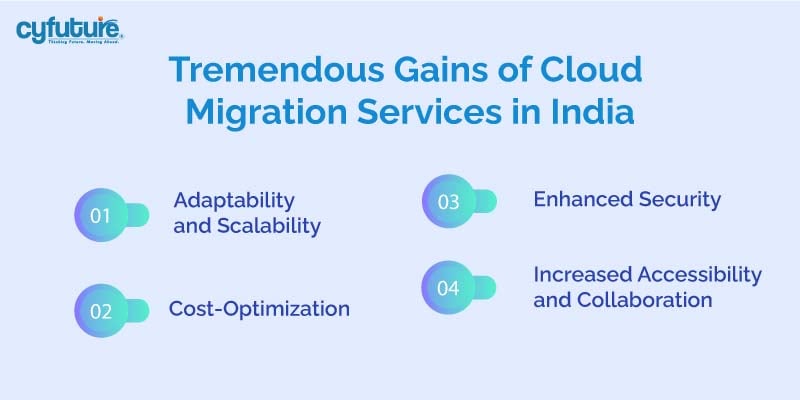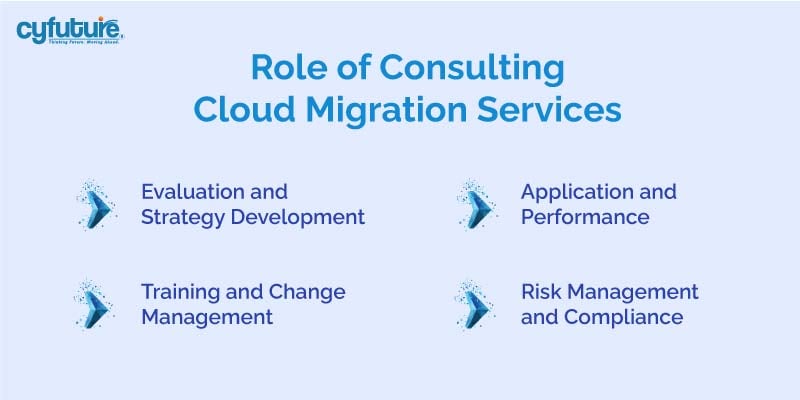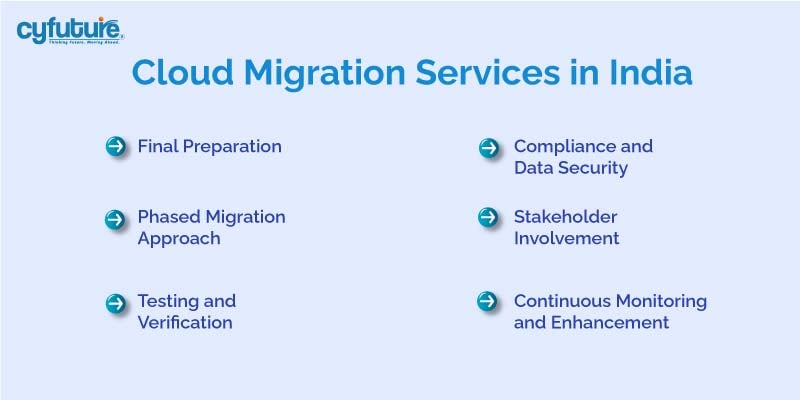-
Get Cloud GPU Server - Register Now!
Toggle navigation

In today’s ever-changing digital landscape, cloud computing is becoming more than just a trend for organizations throughout the world—rather, it is a strategic need. This change is especially significant for India, as cloud computing has the potential to revolutionize whole sectors and promote economic growth there.
As businesses traverse this paradigm change, it is crucial to comprehend the significance of cloud migration services while making future planning choices. Furthermore, learning the ins and outs of cloud migration services is the first step in embracing the cloud, which presents chances for productivity, scalability, and creativity.
Moreover, the necessity of cloud migration services is increasing as Indian businesses proceed with their digital transformations. Cloud-based data, applications, and processes may be more easily moved from on-premises infrastructure to businesses because of these services.
By utilizing the expertise of consulting cloud migration services, businesses may unlock new development possibilities and reduce risks related to current IT systems.
Well, this blog delves into the use of cloud migration services in India and their revolutionary potential. Furthermore, the study explores the potential applications of these services for businesses to boost productivity, reduce expenses, and foster innovation. Although, we will look into the current trends, issues, and best practices to give readers insight into the challenges associated with cloud adoption.
However, let’s take a look into a few stats and data before delving deep.
Now, let’s look at how cloud migration services will aid you in preparing for the competitive market.
To make the transfer of digital assets and processes from on-premises infrastructure to cloud-based environments easier, cloud migration services provide a range of strategies, tactics, and technologies. To guarantee that businesses suffer the least amount of disruption while making the most profit, this approach entails careful planning, assessment, and execution.
Scalability, enhanced security, and superior operational efficiency are the primary drivers of India’s need for cloud migration services. To boost operations, improve customer experiences, and spur innovation, companies across various industries—including finance, healthcare, retail, and manufacturing—are increasingly looking to cloud solutions.

Using cloud migration services in India has a lot of advantages. Some of the top ones are the following:
Elastic scalability offered by cloud platforms allows businesses to adjust their resources in response to fluctuations in demand. For Indian startups and growing companies seeking rapid expansion without incurring significant upfront costs, this flexibility is beneficial.
By shifting to a pay-as-you-go model, moving to the cloud reduces capital expenditures for hardware and upkeep. Businesses looking to redirect their IT budgets toward more strategic endeavors may find these cost savings appealing.
Effective cybersecurity measures, which often surpass traditional IT settings, are heavily invested in by cloud service firms. Maintaining compliance with India’s increasingly stringent regulatory compliance standards and safeguarding sensitive data depend on this improved security posture.
Cloud solutions facilitate easy cooperation amongst geographically dispersed teams by centralizing data storage and offering real-time communication capabilities. Since both productivity and inventiveness are necessary for success in a cutthroat environment, this accessibility fosters both of these traits.
The following challenges must be carefully examined before migrating to the cloud, despite its numerous benefits:
The antiquated systems that many Indian firms use might not be compatible with cloud settings. Compatibility issues like these call for careful planning and sometimes unusual solutions to ensure a smooth transition.
It might be challenging and time-consuming to transfer massive amounts of data to the cloud. To reduce the possibility of data loss or corruption during transmission, effective data management techniques are essential. These include data cleansing and validation.
The regulatory framework in India, which includes GDPR-style privacy laws and data localization regulations, makes cloud adoption more challenging. To preserve data sovereignty and adhere to industry norms, businesses must compromise on these limitations.

A key component of helping businesses navigate the challenges of cloud implementation is consulting cloud migration services. To enhance migration processes and optimize benefits, these services offer specialized expertise, strategic planning, and practical support. Among the main duties of consulting services are:
Consultants do in-depth analyses of the current IT infrastructure, prioritize migrations, and offer tailored solutions that align with organizational objectives.
Experts oversee the implementation process from sample migrations to large-scale installations, ensuring minimal disruption to business operations while optimizing cost savings.
Consultants offer advice on data security procedures, risk management techniques, and regulatory compliance requirements specific to the legal framework in India.
Adopting cloud computing successfully requires both user training and efficient change management. Consultants provide training courses, seminars, and ongoing support to assist businesses in becoming ready for change.
Looking ahead, the following topics are probably going to have an impact on India’s future cloud adoption:
Hybrid and multi-cloud systems are being used by organizations more often to capitalize on best-in-class solutions, minimize vendor lock-in, and enhance performance.
Indian businesses can now obtain meaningful information, automate procedures, and spur innovation across industries thanks to cloud platforms that are integrating AI and machine learning capabilities.
A growing number of industries, including manufacturing, healthcare, and the Internet of Things, are using edge computing solutions because they need real-time data processing and low-latency applications.
As environmental sustainability gains more attention, cloud providers are following suit, aligning with India’s sustainable development commitments by aiming for carbon-neutral operations and energy-efficient data centers.

Companies should adhere to these best practices to accomplish a successful cloud migration in India:
Make a thorough migration strategy that includes a date, an assessment of the current infrastructure, and a decision on the migration priorities. This plan should consider any issues and be in line with the objectives of the business.
Put in place robust security procedures to protect sensitive data both during and after transfer. Make sure you are adhering to regional regulations, including industry norms and data localization laws.
Think of a phased migration approach, where you start with non-essential programs and work your way up to more important workloads. This lessens disruption and permits adjustments based on preliminary results.
Throughout the migration process, involve key stakeholders including business units, end users, and IT teams. Achieving alignment and prompt problem resolution is made possible by consistent communication and teamwork.
At every stage, do thorough testing and validation to identify and address issues early in the migration process. User acceptability testing is included in this, along with security and performance testing.
Monitoring cloud security, performance, and costs is recommended after migration. Optimize resources and configurations based on real-time data to maximize the advantages of cloud adoption.
Ultimately, cloud computing has a bright future in India. Cloud migration services give businesses a vital doorway to increase flexibility, cut expenses, and foster innovation in a rapidly evolving digital landscape. By carefully adopting these services and using the knowledge of consulting partners, organizations may overcome obstacles, seize opportunities, and achieve long-term development and competitive advantage.
The importance of cloud technology will only increase across all industries as India continues on its road to digital transformation. Organizations may succeed in the era of digital disruption by fully using the potential of cloud migration services by remaining proactive, adaptable, and knowledgeable.
At last, making the move to the cloud is more than simply a technological advancement—it is a strategic need for developing a strong and forward-thinking company in India’s fast-paced economic landscape. Setting cloud migration as a top priority may enable businesses to achieve new heights of productivity, innovation, and competitiveness, paving the way for a prosperous digital future.
Are you prepared to use cloud migration services to enhance your company? To begin your journey to more flexibility, reduced expenses, and unmatched creativity, get in touch with our knowledgeable consulting team right now. Allow us to help you navigate the challenges of cloud adoption so that your company may benefit from a competitive edge in the digital age. It’s time to embrace cloud computing in India!
Managing large-scale data transfers, guaranteeing regulatory compliance, integrating current systems, and addressing potential security threats are typical problems. These problems might be lessened with enough planning and knowledgeable teaching.
Expertise, tactical planning, and practical support are offered by consulting cloud migration services throughout the migration procedure. They support the evaluation of the current IT infrastructure, the creation of tailored strategies, the management of risks, the assurance of compliance, and the provision of training and change management.
A focus on sustainability and green computing, the usage of hybrid and multi-cloud solutions, the integration of AI and machine learning, and the rise of edge computing are some of the major themes. In India, these factors are propelling the advancement and growing uptake of cloud computing technology.
Businesses may foster innovation, increase resilience, and keep a competitive advantage by implementing cloud migration as a strategic goal. It contributes to the development of an enterprise fit for the future that can prosper in India’s vibrant business environment.
To examine their present infrastructure, create a strategic migration strategy, and carry out the conversion process while resolving obstacles and maximizing advantages, businesses may begin by speaking with professionals in cloud migration. Working with knowledgeable advisors may greatly speed up the cloud migration process.